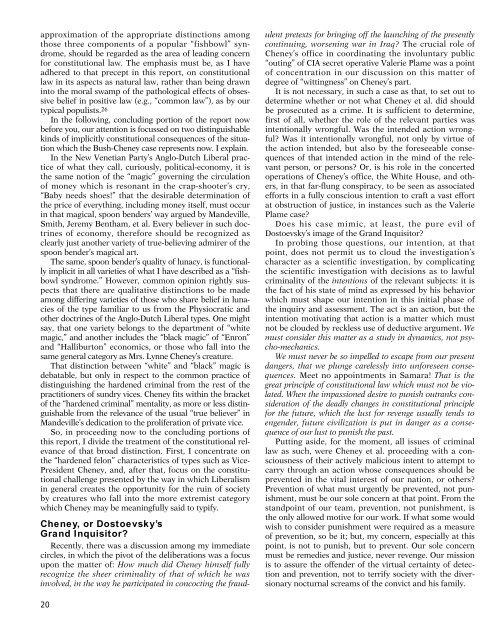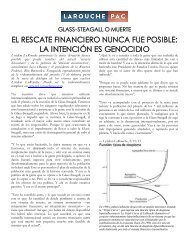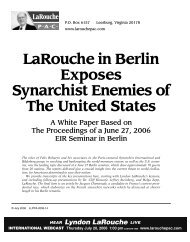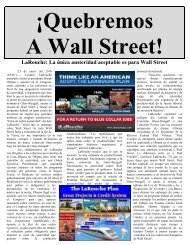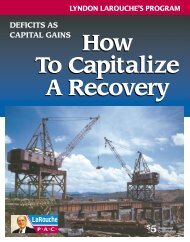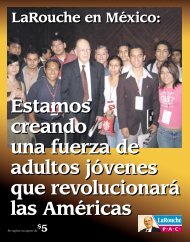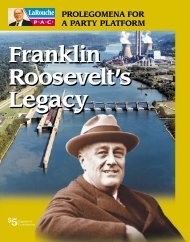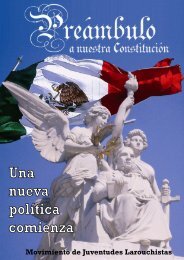Spoon-Benders - LaRouche - LaRouchePAC
Spoon-Benders - LaRouche - LaRouchePAC
Spoon-Benders - LaRouche - LaRouchePAC
Create successful ePaper yourself
Turn your PDF publications into a flip-book with our unique Google optimized e-Paper software.
approximation of the appropriate distinctions among<br />
those three components of a popular “fishbowl” syndrome,<br />
should be regarded as the area of leading concern<br />
for constitutional law. The emphasis must be, as I have<br />
adhered to that precept in this report, on constitutional<br />
law in its aspects as natural law, rather than being drawn<br />
into the moral swamp of the pathological effects of obsessive<br />
belief in positive law (e.g., “common law”), as by our<br />
typical populists. 26<br />
In the following, concluding portion of the report now<br />
before you, our attention is focussed on two distinguishable<br />
kinds of implicitly constitutional consequences of the situation<br />
which the Bush-Cheney case represents now. I explain.<br />
In the New Venetian Party’s Anglo-Dutch Liberal practice<br />
of what they call, curiously, political-economy, it is<br />
the same notion of the “magic” governing the circulation<br />
of money which is resonant in the crap-shooter’s cry,<br />
“Baby needs shoes!” that the desirable determination of<br />
the price of everything, including money itself, must occur<br />
in that magical, spoon benders’ way argued by Mandeville,<br />
Smith, Jeremy Bentham, et al. Every believer in such doctrines<br />
of economy, therefore should be recognized as<br />
clearly just another variety of true-believing admirer of the<br />
spoon bender’s magical art.<br />
The same, spoon bender’s quality of lunacy, is functionally<br />
implicit in all varieties of what I have described as a “fishbowl<br />
syndrome.” However, common opinion rightly suspects<br />
that there are qualitative distinctions to be made<br />
among differing varieties of those who share belief in lunacies<br />
of the type familiar to us from the Physiocratic and<br />
other doctrines of the Anglo-Dutch Liberal types. One might<br />
say, that one variety belongs to the department of “white<br />
magic,” and another includes the “black magic” of “Enron”<br />
and “Halliburton” economics, or those who fall into the<br />
same general category as Mrs. Lynne Cheney’s creature.<br />
That distinction between “white” and “black” magic is<br />
debatable, but only in respect to the common practice of<br />
distinguishing the hardened criminal from the rest of the<br />
practitioners of sundry vices. Cheney fits within the bracket<br />
of the “hardened criminal” mentality, as more or less distinguishable<br />
from the relevance of the usual “true believer” in<br />
Mandeville’s dedication to the proliferation of private vice.<br />
So, in proceeding now to the concluding portions of<br />
this report, I divide the treatment of the constitutional relevance<br />
of that broad distinction. First, I concentrate on<br />
the “hardened felon” characteristics of types such as Vice-<br />
President Cheney, and, after that, focus on the constitutional<br />
challenge presented by the way in which Liberalism<br />
in general creates the opportunity for the ruin of society<br />
by creatures who fall into the more extremist category<br />
which Cheney may be meaningfully said to typify.<br />
Cheney, or Dostoevsky’s<br />
Grand Inquisitor?<br />
Recently, there was a discussion among my immediate<br />
circles, in which the pivot of the deliberations was a focus<br />
upon the matter of: How much did Cheney himself fully<br />
recognize the sheer criminality of that of which he was<br />
involved, in the way he participated in concocting the fraud-<br />
20<br />
ulent pretexts for bringing off the launching of the presently<br />
continuing, worsening war in Iraq? The crucial role of<br />
Cheney’s office in coordinating the involuntary public<br />
“outing” of CIA secret operative Valerie Plame was a point<br />
of concentration in our discussion on this matter of<br />
degree of “wittingness” on Cheney’s part.<br />
It is not necessary, in such a case as that, to set out to<br />
determine whether or not what Cheney et al. did should<br />
be prosecuted as a crime. It is sufficient to determine,<br />
first of all, whether the role of the relevant parties was<br />
intentionally wrongful. Was the intended action wrongful?<br />
Was it intentionally wrongful, not only by virtue of<br />
the action intended, but also by the foreseeable consequences<br />
of that intended action in the mind of the relevant<br />
person, or persons? Or, is his role in the concerted<br />
operations of Cheney’s office, the White House, and others,<br />
in that far-flung conspiracy, to be seen as associated<br />
efforts in a fully conscious intention to craft a vast effort<br />
at obstruction of justice, in instances such as the Valerie<br />
Plame case?<br />
Does his case mimic, at least, the pure evil of<br />
Dostoevsky’s image of the Grand Inquisitor?<br />
In probing those questions, our intention, at that<br />
point, does not permit us to cloud the investigation’s<br />
character as a scientific investigation, by complicating<br />
the scientific investigation with decisions as to lawful<br />
criminality of the intentions of the relevant subjects: it is<br />
the fact of his state of mind as expressed by his behavior<br />
which must shape our intention in this initial phase of<br />
the inquiry and assessment. The act is an action, but the<br />
intention motivating that action is a matter which must<br />
not be clouded by reckless use of deductive argument. We<br />
must consider this matter as a study in dynamics, not psycho-mechanics.<br />
We must never be so impelled to escape from our present<br />
dangers, that we plunge carelessly into unforeseen consequences.<br />
Meet no appointments in Samara! That is the<br />
great principle of constitutional law which must not be violated.<br />
When the impassioned desire to punish outranks consideration<br />
of the deadly changes in constitutional principle<br />
for the future, which the lust for revenge usually tends to<br />
engender, future civilization is put in danger as a consequence<br />
of our lust to punish the past.<br />
Putting aside, for the moment, all issues of criminal<br />
law as such, were Cheney et al. proceeding with a consciousness<br />
of their actively malicious intent to attempt to<br />
carry through an action whose consequences should be<br />
prevented in the vital interest of our nation, or others?<br />
Prevention of what must urgently be prevented, not punishment,<br />
must be our sole concern at that point. From the<br />
standpoint of our team, prevention, not punishment, is<br />
the only allowed motive for our work. If what some would<br />
wish to consider punishment were required as a measure<br />
of prevention, so be it; but, my concern, especially at this<br />
point, is not to punish, but to prevent. Our sole concern<br />
must be remedies and justice, never revenge. Our mission<br />
is to assure the offender of the virtual certainty of detection<br />
and prevention, not to terrify society with the diversionary<br />
nocturnal screams of the convict and his family.


